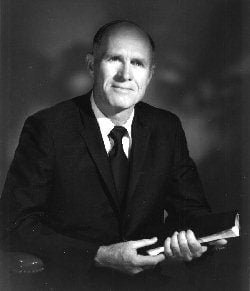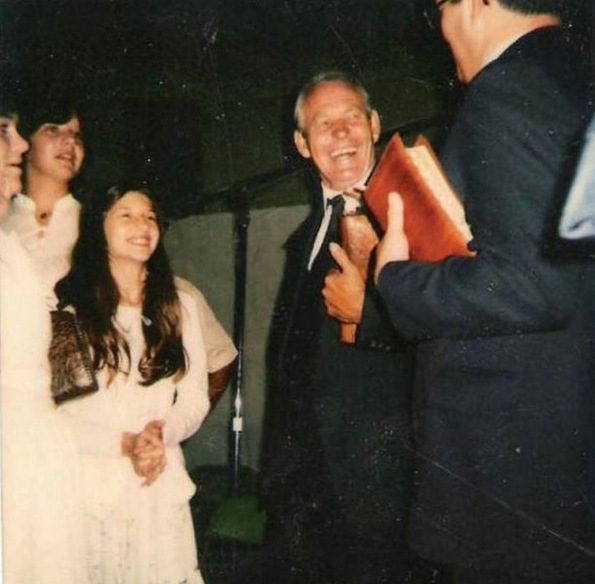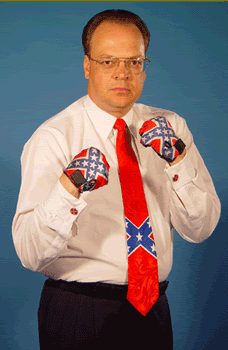
In the 1970s, Independent Fundamentalist Baptist (IFB) preacher Lester Roloff began what later would be called the IFB teen home industry (re-education camps). In 1958, Roloff started The Lighthouse for Boys, a home for “delinquent boys to be isolated from drugs and liquor until they were delivered.” Marie, Lester Roloff’s wife had this to say about The Lighthouse:
“the Lighthouse has been a haven for boys no one else wanted- boys who were one step from reform school or the penitentiary. … The boys come in all sizes and shapes, but they have one thing in common regardless of their age- they are old in sorrow, sadness, and hostility. … At first the boys cover their inward hurts with belligerence and a bravado that they do not actually possess. These boys are almost without exception bereft of parental love and guidance. Some are actually homeless while others have rebelled against parental authority and have gotten into serious trouble with the law.”
In 1967, “while preaching at a gospel meeting in the Fort Worth, Texas area,… Roloff became aware of a need for a home for unwed pregnant girls.” A short time later, Roloff started the Rebekah Home for Girls near Corpus Christi, Texas. Marie Roloff described the girls at Rebekah Home this way:
“as we began working with these girls, we realized that many of them were unwanted and consequently unloved. Lester said, ‘No wonder children have become embittered and even criminals at an early age. They’ve never seen love in those who gave them birth. The right kind of love would lock and stop the wheels of divorce, delinquency, murder and war and turn this hell on earth into a haven of peace, rest, and joy for these children.”
Countless IFB churches and pastors supported Roloff in his attempt to bring order, discipline, and righteousness into the lives of rebellious teenagers. When parents were frustrated with their “rebellious” teenager and didn’t know what to do, The Lighthouse for Boys and Rebekah Home for Girls became the go-to places to send their children. Their pastor assured them that Brother Roloff knew how to “fix” their offspring. (Please see the Texas Monthly feature article, Remember the Christian Alamo.)
Many parents, churches, and pastors didn’t understand that Roloff and his staff used violence to beat children into submission. After the homes closed for the last time in 2001, The Texas Monthly reported:
…The Rebekah Home took in fallen girls from “jail houses, broken homes, hippie hives, and dope dives” who were “walking through the wilderness of sin,” he told his radio listeners. Roloff remade these “terminal cases” into Scripture-quoting, gospel-singing believers. Girls who had been saved harmonized along with his Honeybee Quartet at revivals and witnessed to the power of the Lord on his radio show. He showed off his Rebekah girls at every turn, and he was amply rewarded: Each day, packages arrived at Roloff Evangelistic Enterprises laden with checks, cash, jewelry, the family silver—whatever the faithful could provide.
Discipline at the Rebekah Home was rooted in a verse from Proverbs: “Withhold not correction from the child: for if thou beatest him with the rod, he shall not die.” The dictum was liberally applied. Local authorities first investigated possible abuse at the Rebekah Home in 1973, when parents who were visiting their daughter reported seeing a girl being whipped. When welfare workers attempted to inspect the home, Roloff refused them entry on the grounds that it would infringe on the separation between church and state. Attorney General John Hill promptly filed suit against Roloff Evangelistic Enterprises, introducing affidavits from sixteen Rebekah girls who said they had been whipped with leather straps, beaten with paddles, handcuffed to drainpipes, and locked in isolation cells—sometimes for such minor infractions as failing to memorize a Bible passage or forgetting to make a bed. Roloff defended these methods as good old-fashioned discipline, solidly supported by Scripture, and denied that any treatment at Rebekah constituted abuse. During an evidentiary hearing, he made his position clear by declaring, “Better a pink bottom than a black soul.” Attorney General Hill bluntly replied that it wasn’t pink bottoms he objected to, but ones that were blue, black, and bloody…
…The Rebekah Home was bent on driving sin from even the wickedest of girls and making them see the light of God. Jo Ann Edwards was brought to the Rebekah Home in 1982, after running away from home at the age of thirteen. “I was an acolyte at my church before I went there, and God was very close to me in my heart,” she said in a phone interview from her home in Victoria, where she is the mother of five children. “But that place turned me against Him for a while and made me very hard. I thought that even He had left me.” As a new girl, she was scrutinized by “helpers,” the saved girls who handed out demerits for misbehavior. Demerits were given for an endless host of wrongdoings: talking about “worldly” things, singing songs other than gospel songs, speaking too loudly, doodling, nail biting, looking at boys in church, failing to snitch on other sinners. Each demerit earned her a lick, which the Rebekah Home’s housemother administered with a wood paddle. The beatings left her black and blue. “I got twenty licks my first time, and I was hit hard—so hard that I couldn’t sit for days,” Jo Ann said. “I begged [the housemother] to stop. When she was done, she hugged me and said, ‘God loves you.’ She told me to go back to the living room and read Scripture and sing ‘Amazing Grace’ with the other girls.”
Only Rebekah girls who had proven their devotion by repeatedly testifying to God’s grace could avoid Bible discipline. Some girls were genuinely troubled teenagers who had gotten mixed up with drugs or prostitution; others had been caught having sex; many were guilty of nothing more than growing up in abusive homes. Tara Cummings, now 31 and a mortgage consultant in Chicago, was sent there by her father, a preacher, whose beatings had left her badly bruised. Even she was not immune to judgment. “I was told that I was a reprobate, that I was beyond help and was going to hell,” she said. She was treated to the full range of the Rebekah Home’s punishments, which were not limited to lickings. “Confinement” meant spending weeks hanging her head without speaking. “Sitting on the wall” required sitting with her back against a wall and without the support of a chair, even as her legs buckled beneath her. But kneeling was what she most dreaded. Kneeling could last for as long as five hours at a time; she might have to kneel while holding a Bible on each outstretched palm or with pencils wedged beneath her knees. Only girls seen as inveterate sinners received the full brunt of the home’s crueler punishments. “You had to be saved,” Tara said. “It didn’t matter if you didn’t feel moved to do that—you did it to survive.”
The worst form of punishment, the lockup, was reserved for girls who had not yet been saved—who had talked of running away or who had proven to be particularly intractable. The lockup was a dorm room devoid of furniture or natural light where girls spent days, or weeks, alone. Taped Roloff sermons were piped into the room, and the near-constant sound of his voice was the girls’ only companionship. Former Rebekah resident Tamra Sipes, now 34 and working in advertising for a newspaper in Oak Harbor, Washington, remembers one girl who was relegated to the lockup for an entire month. “The smell had become so bad from her not being able to shower or bathe that it reeked in the hallway,” she said. “We could do nothing to help her. I remember standing in roll call one day waiting for my name to be called off, and I was directly across from the door. She was singing ‘Happy Birthday’ to herself in such a pitiful voice that I couldn’t help but cry for her.”…
You can read the entire Texas Monthly article here.
Though Roloff died in a plane crash in November 1982, the Roloff homes remained in operation until Wiley Cameron, Roloff’s right-hand man, closed them in 2001. When asked about charges of abuse, Cameron stated:
We feel it’s a Bible mandate, like the Samaritan, to help people in the ditch. If we have to get down in the ditch to help people, sometimes we get a little dirty doing it. Put another way, We get troubled kids and we use unconventional methods. We have never abused one person—all of these years, there has never been one case of child abuse that’s been proved in court. There have been allegations, but some people construe abuse where there was not abuse.
In IFB circles, Lester Roloff was quite popular. He and the traveling singing groups from the Rebekah Home for Girls made countless appearances at IFB preacher’s conferences and churches. As a young pastor, I heard them several times. Roloff appealed to pastors to support his work through his preaching and the singing of the Honey Bees, Rainbow Quartet, and Rebekah Choir. Pastors, thrilled that there was a place where troubled church teenagers could get godly, Fundamentalist Christian help, made sure Roloff had a steady stream of teenagers to “help.” This stream would later number 500 or more children under the care of Roloff’s “ministries.”
The above video from 1979 was recorded at Piney Heights Baptist Church, now Lakeside Baptist, in Clearwater, South Carolina. Bill Reese pastored the church for over 50 years. Please listen carefully to this video. Look at the girls in the singing group. What do you see? Happiness? Joy? Where are their smiles? Listen as Roloff calls his charges terminal cases, and dividends paid out to stockholders. Listen, as Roloff and Reese brag about how God is using them in a mighty way.
My wife and I grew up in the Independent Fundamentalist Baptist (IFB) church movement, attended Midwestern Baptist College, an IFB institution operated by Tom Malone, and pastored several IFB churches in the 1970s and 1980s. Lester Roloff and the great work he was doing in Texas and his battle against the evil government were topics of frequent discussion. We never heard one person speak negatively about Roloff. While we heard rumors about the charges of abuse, these rumors were dismissed as government attempts to destroy Roloff’s work or the words of jealous men who weren’t as blessed by God as Brother Roloff was.
Influenced by Roloff, many IFB pastors started up group homes to help rebellious teenagers. New Bethany Home for Girls was one such enterprise. In 1971, Mack Ford opened New Bethany. Following the Roloff blueprint, administrators used physical violence to break the will of rebellious teenage girls who were incarcerated against their will at New Bethany. Girls were also sexually violated, molested, and raped. As with Wiley Cameron in 2001, Ford denied anything untoward happened at New Bethany. He died on February 11, 2015, having never been brought to justice.
It’s time for IFB churches and pastors to atone for their sins. It is now known that IFB teen group homes routinely used violence to harm the vulnerable boys and girls sent to them. In some instances, sexual abuse took place, and serial predators committed criminal acts. In addition, IFB churches and pastors provided these homes with a steady supply of children (and money), children whose lives were often scarred forever by their experiences at these homes. Just as the man who drives the getaway car for a robbery crew is an accessory to robbery, IFB preachers are culpable in the abuse that took place at The Lighthouse, Rebekah Home for Girls, New Bethany Home for Girls, New Bethany Home for Boys, Hephzibah House, and other similar red-education centers.
Where are the IFB pastors who are willing to admit their culpability? Where are the preachers who are willing to air the dirty laundry of the IFB church movement publicly? Countless boys and girls had their lives ruined by men like Lester Roloff and Mack Ford. Thanks to the Internet, the stories of abuse, rape, and violence are readily accessible. So when will a noted IFB pastor, one of the big dogs, decide to publicly and completely expose IFB teen group homes for what they are/were: money-making businesses that abused and molested children in the name of God?
Here and there, often under the radar, IFB teen group homes are still in operation. Exempt from state and federal laws, these homes are free to follow Roloff’s plan for making rebellious teenagers submissive. In some cases, these current Roloffs and Fords use their homes to take sexual advantage of vulnerable boys and girls. So why is there not an IFB pastor willing to stand up and say ENOUGH? Is their hatred of the government blinding them to what went on in these homes and what continues to go on until this day?
Thankfully, I can say that I never had a part in sending a child to one of the IFB teen group homes. It almost happened once, but the parents decided against it. In the 1980s, Ron Williams and a group from Hephzibah House came to the church I pastored in southeast Ohio. By then, I had doubts about the IFB church movement, so nothing came of Williams’ visit to our church.
While my hands are relatively clean, I know a number of pastors who promoted and supported men like Lester Roloff, Mack Ford, Jack Patterson, Olen King, Ron Williams, and others whose names are lost to me. Countless IFB churches and pastors continue to materially and financially support unlicensed teen group homes that use violence to break “rebellious” teenagers. Why do they continue to do so? Why do they lend their support to abuse and violence?
For further information on IFB teen group homes (please use the contact form to send me any other links that should be added to this list):
Sexual Abuse in the Name of God: New Bethany Home for Girls
Kathryn Joyce, Horror Stories from Tough-Love Teen Homes
HEAL database for New Bethany Home for Girls
HEAL articles on Fraudulent and Abusive Treatment Centers for Children and Young Adults








